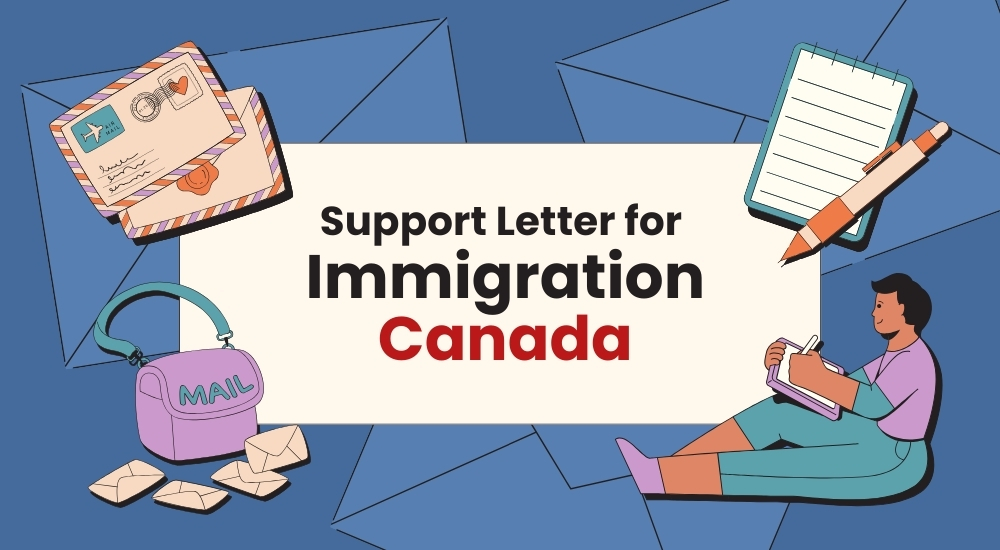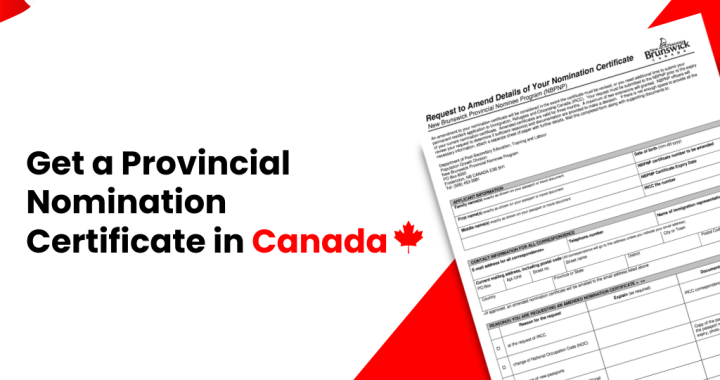How to Write an Support Letter for Immigration Canada

When applying for immigration to Canada, every document counts—and a well-crafted support letter can make a significant difference. Whether you’re supporting a family member, friend, or colleague, a support letter can strengthen an immigration application by providing a personal perspective on the applicant’s character, ties to Canada, and reasons for immigrating.
In this guide on how to write a compelling support letter for Canadian immigration, we’ll walk you through why a support letter matters, its purpose, and how to write an effective one. Plus, we’ll include a sample letter, key tips, and answers to common questions.
Why a Support Letter Matters for Immigration to Canada
A support letter can demonstrate genuine intent to settle in Canada or prove that the applicant won’t overstay a temporary visa. This added layer of credibility can tip the scales in favor of approval for Immigration to Canada.
Immigration officers at Immigration, Refugees and Citizenship Canada (IRCC) review countless files, and a compelling support letter can set an applicant apart. It provides evidence of relationships, community ties, or financial support, which can bolster claims made in the application, whether it’s for a spousal sponsorship, visitor visa, or permanent residency.
Purpose of a Supporting Letter for Immigration Canada
The primary purpose of a support letter is to vouch for the applicant and clarify their intentions or circumstances. Depending on the immigration stream—such as Express Entry, family sponsorship, or a study permit—the letter’s focus may vary. Generally, it aims to:
- Confirm the relationship between the sponsor and the applicant.
- Highlight the applicant’s positive traits (e.g., honesty, work ethic, or community involvement).
- Provide context for the application (e.g., why the applicant wants to move to Canada).
- Offer assurance of support (emotional, financial, or logistical) if applicable.
These points help immigration officers assess the applicant’s eligibility and authenticity.
Guide to Writing an Effective Letter of Support for Immigration Canada
A support letter should be a clear, concise, and persuasive letter having the following elements:
Step 1: Start with Your Contact Information
Include your full name, address, phone number, and email at the top. If applicable, add your occupation or status (e.g., Canadian citizen or permanent resident).
Step 2: Date the Letter
Add the current date to ensure the letter aligns with the application timeline.
Step 3: Address the Letter Properly
If possible, address it to “Immigration, Refugees and Citizenship Canada” or the specific visa office handling the application. A generic “To Whom It May Concern” works if you’re unsure.
Step 4: Introduce Yourself
State who you are, your relationship to the applicant, and how long you’ve known them.
Step 5: Explain the Purpose of the Letter
Clearly state that you’re writing to support the applicant’s immigration application and specify the type (e.g., spousal sponsorship or visitor visa).
Step 6: Provide Details About the Applicant
Highlight their character, skills, or contributions. Include specific examples, like their dedication to family or community involvement.
Step 7: Offer Support (If Applicable)
If you’re providing financial, emotional, or housing support, detail your commitment and ability to follow through.
Step 8: Close with a Strong Endorsement
Reaffirm your support and offer the officer to contact you for further clarification, if any, required by him. Sign the letter by hand (if submitting a hard copy) and include your full name.
Step 9: Notarize (Optional)
For some applications, notarizing the letter adds credibility—check the specific requirements with IRCC.
Red Flags in a Winning Support Letter for Immigration Canada
- Acknowledge the Red Flag In case the person you are sponsoring has any history that the immigration official would like to know more about, start by directly addressing the specific red flag. For example, if the applicant has a criminal record, briefly mention it without going into excessive detail. Acknowledging the issue shows honesty and transparency, which can build trust with immigration officials.
- Provide Context Explain the circumstances surrounding the red flag. This could involve discussing the context of a past conviction, such as its timing, severity, and how it was a one-time incident rather than indicative of ongoing behavior.
- Highlight Personal Growth Emphasize any positive changes the applicant has made since the incident. Discuss how they have taken steps to improve themselves to demonstrate their commitment to personal development and to have a clean record for the future.
- Focus on Positive Attributes After addressing the red flag, shift the focus back to the applicant’s strengths and positive contributions to society. Highlight their skills, achievements, and character traits that make them a valuable addition to Canada. This balance can help mitigate the negative impact of the red flag.
- Include Supportive Testimonials If possible, include testimonials or statements from reputable individuals who can vouch for the applicant’s character and growth. This could be from employers, community leaders, or mentors who can provide a well-rounded perspective on the applicant’s journey.
- Conclude with Confidence End your letter with a strong statement reaffirming your support for the applicant despite their past issues. Express your belief in their potential to contribute positively to Canadian society and your willingness to provide further information if needed.
A winning letter balances professionalism with heartfelt support, making it both credible and compelling.
Sample Letter of Support for Immigration to Canada
Here is an example of a Sample Letter of Support for Immigration to Canada
[Your Full Name] 123 Maple Street, Toronto, ON M5V 2T6
Phone: (416) 555-1234 | Email: yourname@email.com
March 23, 2025
Immigration, Refugees and Citizenship Canada
[Visa Office Address, if known]
To Whom It May Concern,
My name is [Your Name], a Canadian citizen and resident of Toronto, Ontario. I am writing to support the permanent residency application of my brother, [Applicant’s Full Name], whom I have known for 32 years. As his sibling and a long-time supporter, I am thrilled to endorse his move to Canada.
[Applicant’s Name] is a hardworking, honest individual with a proven track record in his field of study.
I am also prepared to assist [Applicant’s Name] as he settles in Canada. I will provide temporary housing at my residence and help him secure employment through my professional network. My stable income as a [Your Occupation] ensures I can support him during his transition.
I wholeheartedly believe [Applicant’s Name] will be an asset to Canada. Please feel free to contact me at (416) 555-1234 or yourname@email.com if you require further information.
Sincerely,
[Your Signature]
[Your Full Name]
Dos & Don’ts When Writing a Supporting Letter for Immigration Canada
Dos:
- Do keep it concise (1-2 pages max).
- Do proofread for grammar and spelling errors.
- Do tailor the letter to the specific immigration program.
- Do include verifiable details (e.g., dates, locations).
- Do express genuine enthusiasm for the applicant’s move.
Don’ts:
- Don’t exaggerate or lie—IRCC may verify claims.
- Don’t use generic templates without personalization.
- Don’t include irrelevant details (e.g., unrelated anecdotes).
- Don’t write in an overly emotional tone—keep it balanced.
- Don’t forget to sign and date the letter.
Frequently Asked Questions
Who can write a support letter for immigration to Canada?
Anyone with a genuine relationship to the applicant—family, friends, employers, or community members—can write a support letter, provided they can speak to the applicant’s character or circumstances.
Is a support letter mandatory?
No, it’s not always required, but it can strengthen an application, especially for sponsorships or discretionary cases.
How long should a support letter be?
Aim for 1-2 pages—long enough to convey key points but short enough to respect the officer’s time
Can a support letter be rejected?
While the letter itself isn’t “rejected,” vague, inconsistent, or dishonest content may undermine its effectiveness.
Do I need to submit multiple support letters?
One strong letter is often enough, but additional letters from diverse perspectives (e.g., employer and family) can add depth.
It will be helpful in case Supporting Documents are attached along with a support letter: Attach proof of your relationship (e.g., photos, emails) if relevant.
Summing Up
A support letter for immigration to Canada can come in handy for the applicant you would wish to sponsor in getting a Canadian Visa. By incorporating key elements and avoiding common pitfalls, you can craft a letter that resonates with immigration officers and pave the way for a successful application.

 How to Get a Provincial Nomination Certificate in Canada
How to Get a Provincial Nomination Certificate in Canada  Can Americans Work in Canada?
Can Americans Work in Canada?  How to Convert a Visitor Visa to a Work Permit in Canada
How to Convert a Visitor Visa to a Work Permit in Canada  Canada’s Illegal Immigration Penalties 2025
Canada’s Illegal Immigration Penalties 2025  Canada Immigration Rules 2025
Canada Immigration Rules 2025  PR Card Renewal in Canada: Steps, Fees & Eligibility
PR Card Renewal in Canada: Steps, Fees & Eligibility